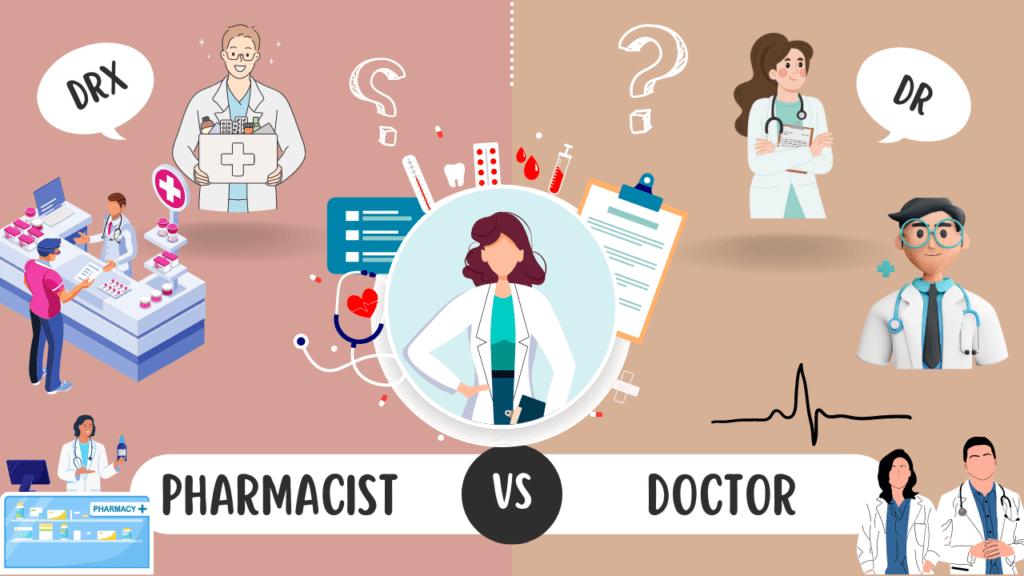Introduction to Dr and DRx
Understanding the terminology used in healthcare is vital for effective communication and optimal health outcomes. Commonly used terms that cause confusion include “Dr” and “DRx”.
Understanding ‘Dr’
The term ‘Dr’ is an abbreviation for ‘Doctor’, widely recognized across numerous fields but most typically associated with medicine.
Delving into ‘DRx’
Less well known to the general public, DRx stands for Doctor of Pharmacy. This term denotes a pharmacist who has completed all the required training to earn this title.

A Deep Dive into the Role of Dr in the Healthcare Field
Education and Training of a Doctor
Becoming a doctor requires an exhaustive educational journey, beginning with an undergraduate degree and proceeding on to four-year medical school before undertaking three to seven-year residency programs.
The Scope of Responsibilities of a Doctor
Doctors diagnose illnesses, provide treatment, and advise patients on their overall health condition. Their roles vary widely, depending on their specialization.
Unveiling the Role of DRx in Pharmacy
The Unique Training of a Pharmacist (DRx)
A Doctor of Pharmacy (DRx) undertakes a distinctive educational journey. After obtaining a Bachelor’s degree, they complete a four-year professional Doctor of Pharmacy degree.
The Wide-ranging Responsibilities of a DRx
DRx’s dispenses medications prescribed by doctors, advise patients on drug usage, and monitor patient health and progress to maximize the effectiveness of drug therapy.
Key Differences between Dr and DRx
Differences in Education and Training
While both Dr and DRx undertake extensive education, the former focuses more on disease diagnosis and management, while the latter centres around the understanding and management of medications.
Differences in Roles and Responsibilities
Dr and DRx play different but equally important roles in the healthcare system. Doctors diagnose and treat diseases while DRx’s focuses on the safe and effective use of medications.
Why is It Important to Know the Difference?
Enhancing Your Healthcare Experience
By knowing the difference between a Dr and DRx, you can better navigate the healthcare system and know whom to approach for particular health concerns.
Making Informed Health Decisions
Knowing the roles of Dr and DRx can help you make more informed decisions about your health, ensuring you get the best care possible.
Conclusion
To truly comprehend the intricacies of healthcare provision, it is crucial to grasp the disparity between Dr and DRx. The roles of a medical doctor (Dr) and a Doctor of Pharmacy (DRx) may appear distinct at first glance, but they intricately interweave to synergistically enhance patient care. From the initial diagnosis to the meticulous treatment approach and the delicate art of medication management, these professionals forge an unyielding alliance on the front lines of health management. Their harmonious collaboration not only ensures the optimum well-being of patients but also embodies a formidable force in the realm of healthcare.
Frequently Asked Questions
Can a DRx write prescriptions?
The ability of a DRx to write prescriptions can vary depending on the regulations of the country or state. Some regions allow DRx’s to prescribe medications within their scope of practice.
Is a DRx a medical doctor?
No, a DRx is a Doctor of Pharmacy, not a medical doctor. They are trained in areas related to medication management rather than the broad medical training doctors receive.
What is the main responsibility of a Dr?
The main responsibility of a Dr is to diagnose diseases, provide treatment, and guide patients regarding their overall health.
What can I expect from a DRx?
A DRx will help manage your medications, ensuring safe and effective usage. They provide guidance on medication side effects, interactions, and optimal usage.
What’s the importance of understanding the difference between Dr and DRx?
Understanding the difference helps patients make informed health decisions and enhances communication in healthcare settings.
